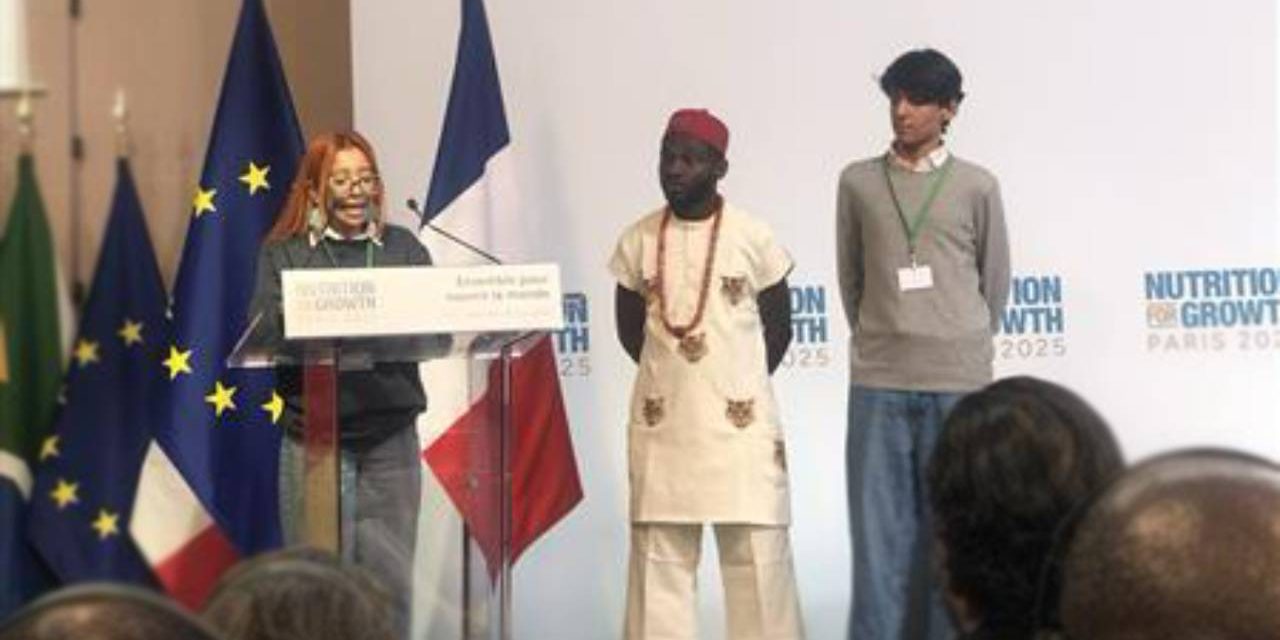As the Nutrition for Growth Summit concludes, children and young people from around the world have presented their Child and Youth Call to Action at the closing ceremony of the Summit urging leaders to confront the global malnutrition crisis. Representing thousands of children and youth who shared their struggles and solutions through the Nutrition Dialogues, they made it clear that real change requires both urgent action and meaningful youth involvement.
You can read their full statement below.
Dear Global Leaders,
We are a group of children and young people who represent our local-based organisations and local communities, and we want to voice particular concerns about the global impact of hunger and malnutrition. Malnutrition is a worldwide crisis where three billion people cannot afford a nutritious diet. One of the major causes of rising malnutrition is the lack of access to clean water, sanitation and healthcare. Many families, especially in rural and remote areas, face difficulties in obtaining these essential services, leading to increased cases of malnutrition.
We have seen that malnutrition often affects more girls and young women, especially in countries where girls do not go to school. Another serious cause is families lacking the money to buy nutritious food, which leads to deficiencies in essential nutrients, impacting physical and cognitive development, especially in children.
Cheaper processed foods often lack vital nutrients, exacerbating the problems and contributing to a cycle of poverty and poor health, as malnutrition affects our ability to study, work and thrive. On the other hand, a significant crisis is occurring in developed countries with ever-increasing carcinogenic products and declining nutritional levels in cultivated produce. In addition, the land where we grow our food is changing and dying.
Climate change has made it unpredictable to know the best times of the year to grow and harvest our food. Weather phenomena are becoming longer and influence the deterioration of crops where food used to be plentiful and is now scarcer and more processed. Floods, landslides, heat waves and soil fertility mean farmers cannot distribute food to the big cities or feed themselves. Meanwhile, the problem in urban areas is that food does not last as long as before, meaning people need to spend more money to be able to feed themselves with the necessary nutritious food.
Our recommendations for action:
- Countries must combine efforts to empower and support families in earning a decent income and reducing poverty, leading to a more prosperous community with improved well-being. This must include better educational opportunities, skills training, mindset change and job creation for the most marginalised and vulnerable families.
- Countries must improve their nutrition programmes, especially school feeding programmes, food aid and nutrition-sensitive agricultural support for local communities to combat malnutrition. These programmes must include community education to teach families about hygiene, exclusive breastfeeding, complementary feeding, and a balanced diet to improve nutrition and empower women and girls in food systems for food security grassroots advocacy.
- Countries must promote education programmes to help families understand the importance of good nutrition and make informed decisions. It is critical to raise awareness using social media, so that people affected know what to do and build a massive movement to educate those affected.
- Countries must generate strategies to ensure access to clean water, promote sustainable agriculture, and mitigate the effects of climate change. These strategies may include using innovative forms of cultivation, natural fertilisers, and avoiding bad processed foods, chemicals and cancerogenic products.
We call on all states to listen to and consider our initiatives from our homes, schools, and universities as essential to addressing these problems. We, as children and young people, are keen to create innovative proposals for transforming our communities. That’s how we demand to be heard and must act now. As malnutrition is a growing global challenge, we must combat this crisis with governments, organisations and communities to ensure a better present and future for all.
We all must be accountable: the governments, the private sector, and society. The fate of our nations lies in how nutrition is prioritised and in its importance in shaping the overall well-being of the nations, not just individuals.
We appreciate your attention and demand that our recommended actions be considered. Nothing is for us without us – we demand to be part of the solutions and decision-making processes. Nutrition should not be a privilege; it should be a right for everyone.










